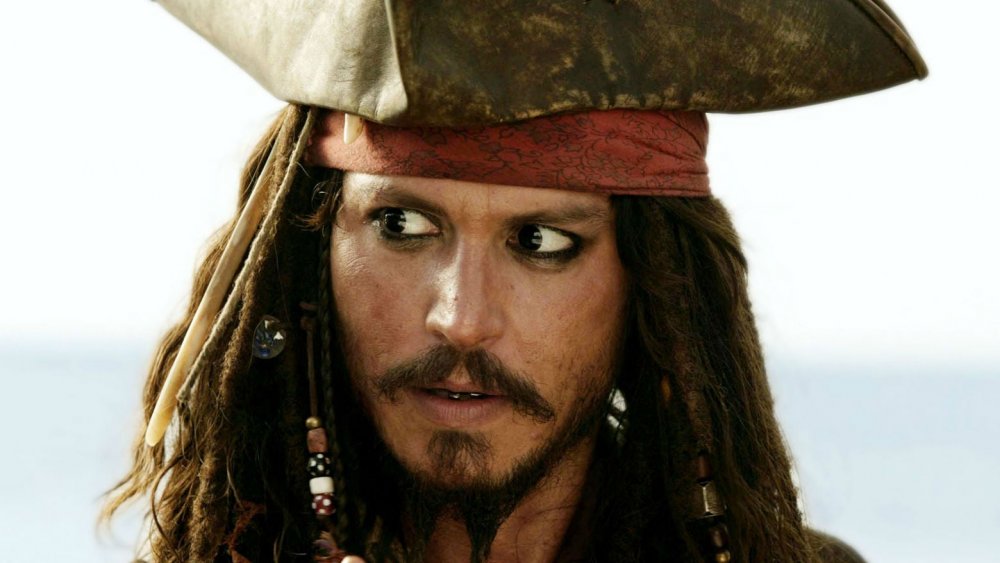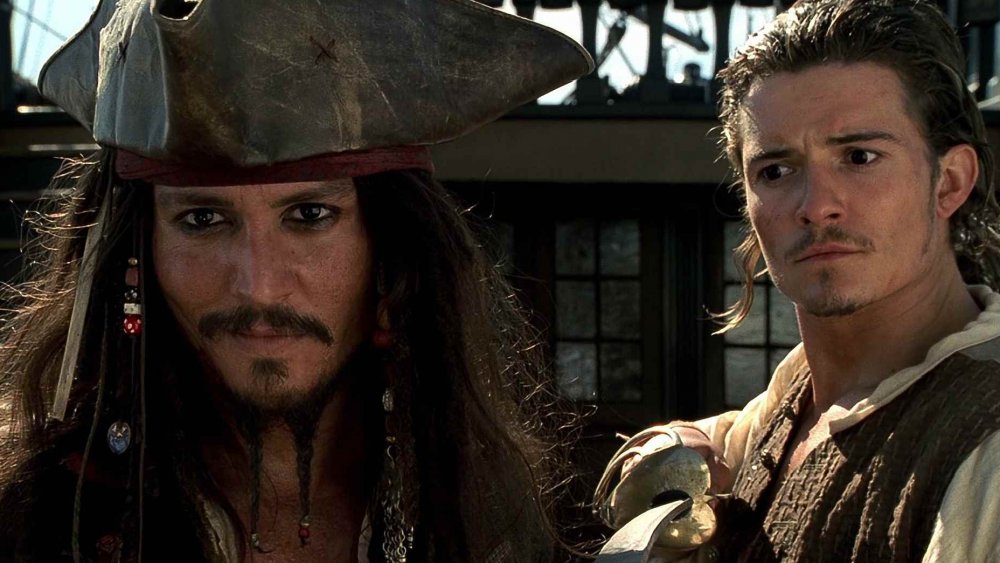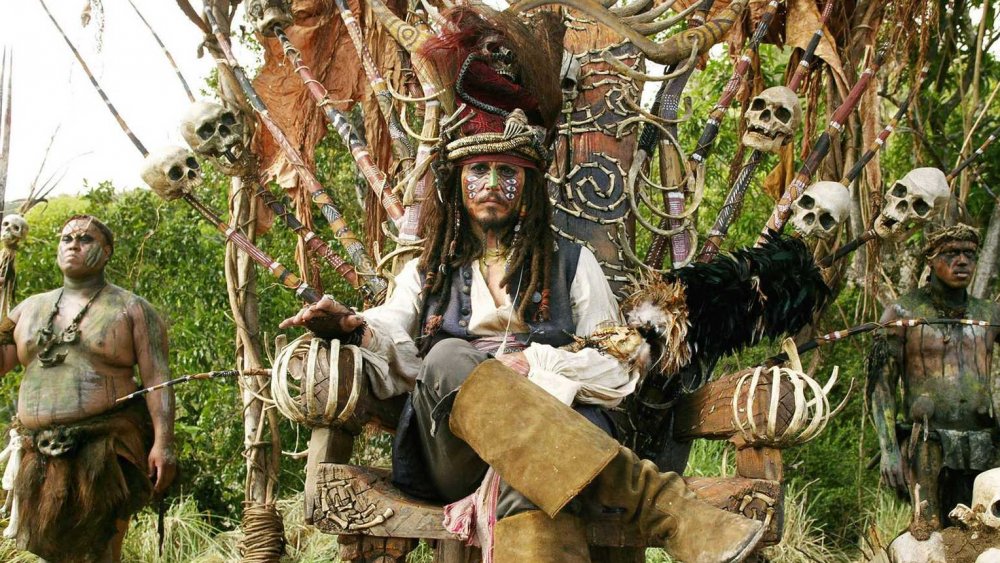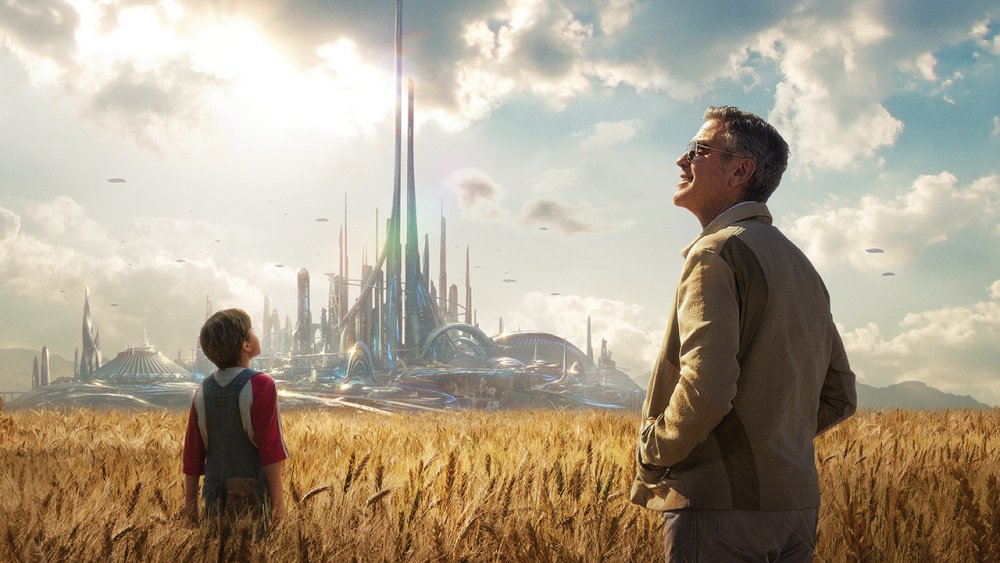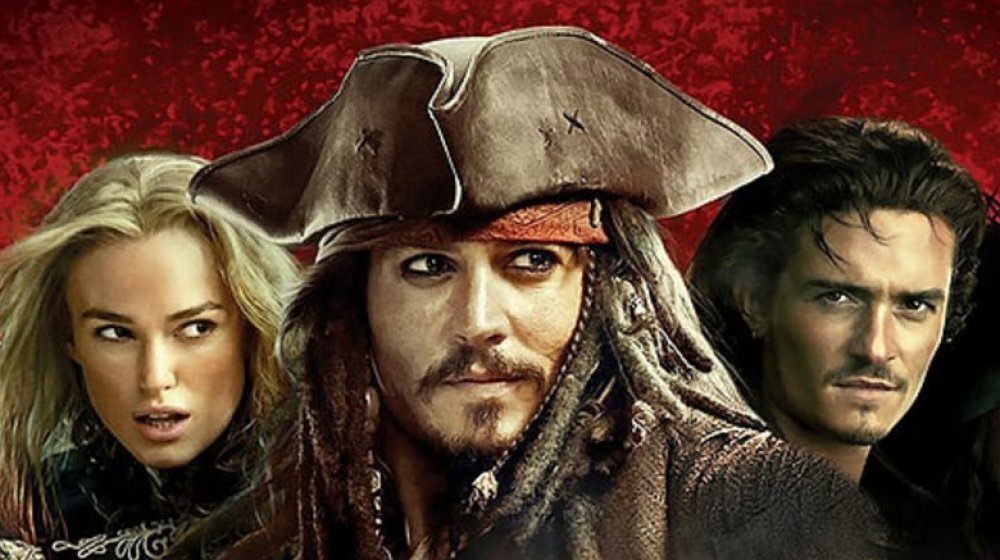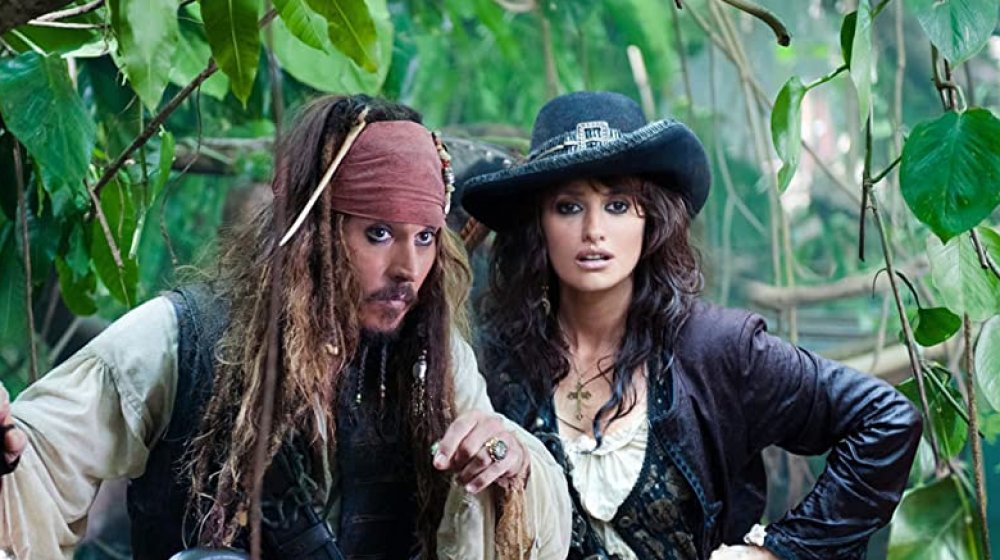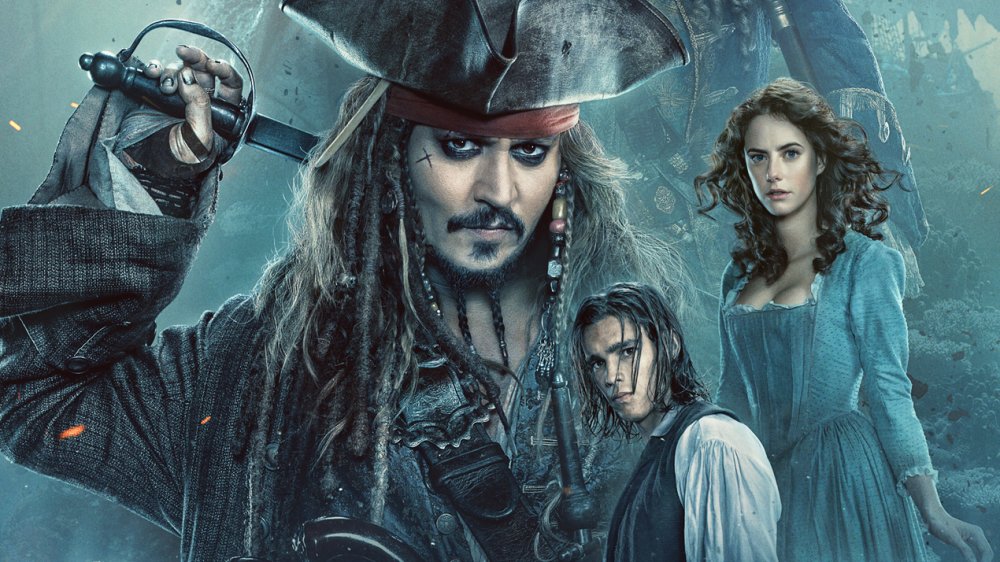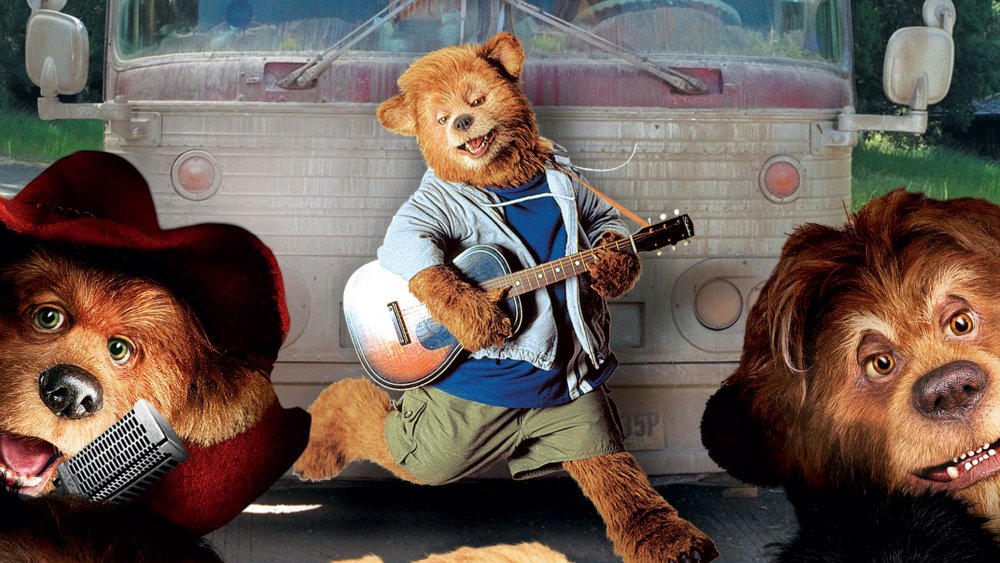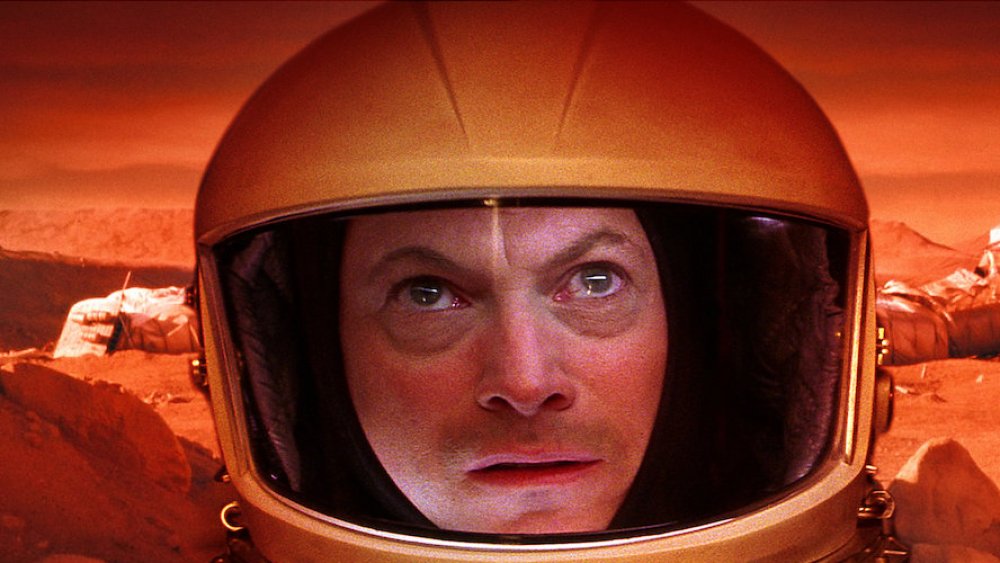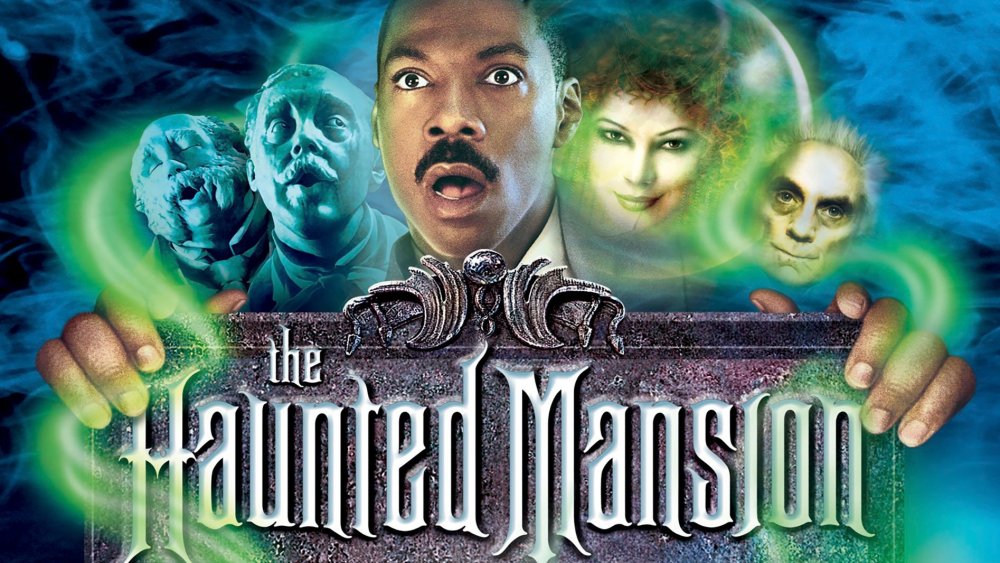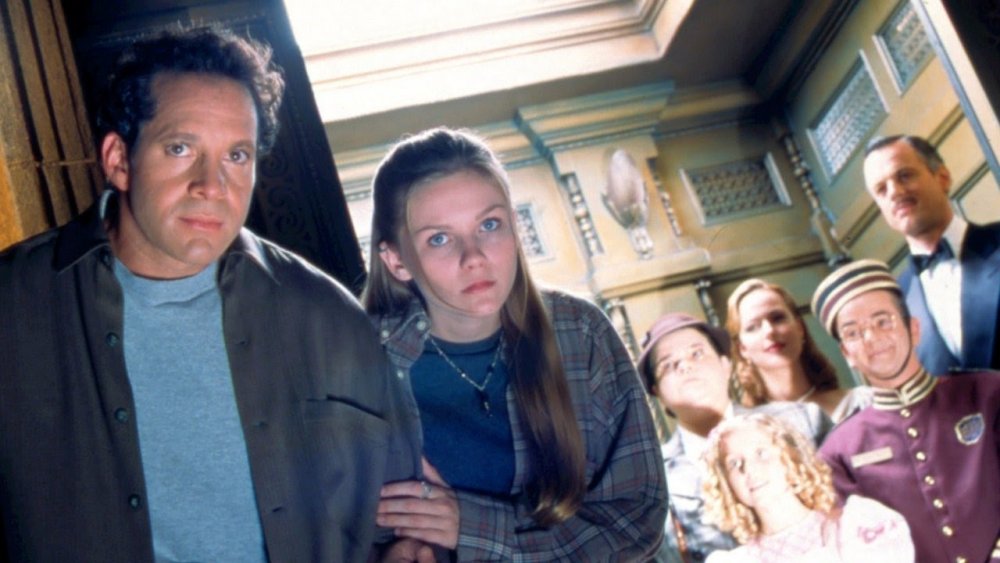The Best And Worst Movies Based On Disney Rides
If there's one thing that Hollywood's proved, it's that you can make a movie out of anything. A board game like Battleship can be the basis for a big-budget summer blockbuster, LEGO can spawn an entire cinematic universe, and even emojis can headline their own animated movie. Given these facts, why wouldn't attractions from the various Disney theme parks be able to launch their own motion pictures? Ever since Disneyland opened its gates in July 1955, the House of Mouse's inventive rides have dazzled parkgoers. These attractions have become so beloved, in fact, that it was really only a matter of time before Disney tried its hand at adapting the thrilling fixtures of Disneyland and Disney World for the big screen.
Starting with 1997's Tower of Terror, Disney has done just that. The assorted adaptations of their theme park rides have ranged from fairly cheap TV movies to some of the most expensive films ever created. As the years have gone by, it's become clear this is no fad: Disney will be making film adaptations of their theme park rides for years to come. But how good are these movies, really? These films have received all sorts of reception, with some garnering rave reviews while others have been utterly lambasted. Join us as we explore the fabulous heights and awful lows of Disney movies based on theme park rides.
Pirates of the Caribbean: The Curse of the Black Pearl
Prior to the release of Pirates of the Caribbean: The Curse of the Black Pearl, a cloud of uncertainty hung over the project. The dismal recent box office track record of pirate movies, Disney's lack of experience with PG-13 movies, and the fact that it's based on a theme park ride all contributed to this unease. However, all of that uncertainty turned into adulation after The Curse of the Black Pearl debuted to strong reviews and spectacular box office returns.
"This is one of the few films that could justify use of a term that should never be used in describing a movie — a thrill ride — since it is, after all, based on one," praised The New York Times. This encapsulates the shock and joy this film was met with: Despite all the reasons there were to doubt it, it turned out to be delightful. By far, the most praised element of Curse of Black Pearl was and is Johnny Depp's performance as Jack Sparrow. The actor's unorthodox approach to playing the slippery pirate scored such widespread acclaim that the character became instantly iconic, and even legitimately prestigious: Depp scored a Best Actor nod at that year's Oscars.
Curse of the Black Pearl might have entered theaters under a cloud of uncertainty, but it ended up sailing beneath the bright sun of critical and commercial acclaim.
Pirates of the Caribbean: Dead Man's Chest
It was always going to be a challenge to replicate the surprise critical success of Pirates of the Caribbean: The Curse of the Black Pearl. That film's sequel, Pirates of the Caribbean: Dead Man's Chest, decided to confront that challenge head-on by drastically expanding the scope of the franchise, adding in numerous new characters and delivering expansive action set pieces. The result is something that's solid, if not as memorable as its predecessor.
Dead Man's Chest earned middling reviews, and was commonly criticized for its too-massive scope. David Ansen of Newsweek complained that Dead Man's Chest is more "cluttered" than exhilarating, while Dana Stevens of Slate decried the film's lack of humanity. Lisa Schwarzbaum of Entertainment Weekly was particularly critical, saying that Dead Man's Chest is like a theme park ride in that "a ticket holder is strapped, overstimulated but unsatisfied, and unable to disengage until the operator releases the restraining harness."
Positive responses to Dead Man's Chest countered these accusations, however: Drew McWeeny praised the movie's darker tone and the visual effects used to bring characters like Davy Jones to life. A.O. Scott of The New York Times went so far as to compare director Gore Verbinski to Steven Spielberg for his work on Dead Man's Chest. Though not as universally beloved as the first Pirates movie, Dead Man's Chest still scored its fair share of acclaim and remains a solid entry in the series.
Tomorrowland
In Tomorrowland, director Brad Bird's second foray into live-action filmmaking, he explores the glittering world of the future. Named after a futuristic section of multiple Disney parks, Tomorrowland's connection to these places of leisure and enchantment goes deeper than its title. The film's opening scene contains an explicit reference to Disneyland when Frank Walker, the film's protagonist, first accesses the realm of Tomorrowland as an adolescent, by sneaking onto the It's A Small World ride. There were even plans to make Tomorrowland's connection to the real-world theme parks even more explicit: Screenwriter Damon Lindelof has detailed a deleted scene that contains an explanation of the real-world Tomorrowlands acting as cover-ups for the true location.
Sadly, Tomorrowland couldn't avoid the mixed notices bestowed on most movies based on Disney theme park attractions. Many critics, such as Peter Travers of Rolling Stone, registered admiration for Tomorrowland's ambition while criticizing it for its storytelling shortcomings. Other critics, like Alison Willmore of Buzzfeed, critiqued Tomorrowland for being more interested in preaching rather than delivering spectacle. Tasha Robinson of The Dissolve summed up many critics' feelings by calling the film "sentimental, overthought, overpolished, and artificial in a way that implies Disney Channel thinking at every step." Such words are a far cry from the kind of adulation heaped on past Brad Bird movies, like Ratatouille or The Incredibles.
Pirates of the Caribbean: At World's End
Third movies can be tricky. Exceptions exist, or course, but for the most part, these installments have developed a reputation for being cash-grabs, rather than organic extensions of beloved stories. Pirates of the Caribbean: At World's End put up quite a fight against this repuation — but unfortunately, the critical reception for At World's End was more Beverly Hills Cop III than Toy Story 3.
At World's End was widely criticized for its bloated nature, which led the film to run for 169 minutes. Total Film criticized the production for putting an avalanche of twists over engaging characters. Tom Charlty of CNN expressed disappointment over how the film offered nothing beyond spectacle. Peter Travers of Rolling Stone listed At World's End as one of the worst movies of 2007, while noting how tired Johnny Depp's Jack Sparrow had become. Finally, Jamie Russell of the BBC invoked At World's End's source material by claiming the film is "duller than a Disneyland ride during a power cut." At World's End had its share of defenders, like Stephen Hunter of The Washington Post, but even those who championed this movie tended to be measured in their admiration. Despite being the second sequel to a widely beloved movie, At World's End inspired responses more akin to "Oh no no" than "Yo ho ho" from critics.
Pirates of the Caribbean: On Stranger Tides
"Watching it, I was bored," film critic Mark Kermode observed of Pirates of the Caribbean: On Stranger Tides. His negative assessment echoed the general critical reception to the fourth Pirates of the Caribbean feature. On Stranger Tides received noticeably worse marks than any of its three predecessors: While the first two Pirates sequels scored criticism for being overstuffed in their aims, critics took On Stranger Tides to task for being entirely devoid of ambition.
This lack of ambition resulted in one of the film's most oft-repeated criticisms: That it is simply boring to watch. Christopher Orr of The Atlantic compared the whole production to a past-its-prime TV drama rather than a sweeping blockbuster. And then there was the criticism lobbed at the film's 3D presentation. The first Pirates movie presented in this format, 3D did not do much to enhance the franchise. Outlets like Cinema Blend condemned On Stranger Tides for having 3D that added nothing to the experience except levels of extreme darkness that made it difficult to see what was going on. While the original Pirates of the Caribbean trilogy had a far from a perfect record with reviewers, with On Stranger Tides, the franchise officially sprung a leak in its critical reception.
Pirates of the Caribbean: Dead Men Tell No Tales
Few franchises have experienced such a straight downward slope in critical reception as the Pirates of the Caribbean movies have. After starting off with positive reviews with The Curse of the Black Pearl, each subsequent film has garnered worse reviews than the last. This trajectory means that the worst-reviewed entry in the saga is also its most recent entry, Dead Men Tell No Tales. Released in May 2017, Dead Men was met with absolutely brutal reviews from a wide variety of critics.
Critics like Sara Stewart of The New York Post disparaged Dead Men Tell No Tales for being "dull, gruesome and obnoxiously loud." A persistent criticism emerged, which decried the film for being derivative of past Pirates adventures. The fact that the film is derived from a theme park ride factors into some of its most stinging critiques, such as a review from Michael O'Sullivan of The Washington Post, who said that Dead Men "remains true to its Disney theme park roots ... it feels like the vacation that you'll need a vacation from." Only Javier Bardem's turn as the film's villain Armando Salazar drew any praise. Otherwise, Dead Men Tell No Tales totally washed out with critics, a far cry from the unexpectedly positive critical response that greeted The Curse of the Black Pearl.
The Country Bears
Released in July 2002, The Country Bears is a film adaptation of the Country Bear Jamboree, a stage show known for its animatronics. The film garnered absolutely atrocious reviews upon its debut. Ann Hornaday of The Washington Post called The Country Bears "virtually laugh-free," while Ken Hanke of Mountain XPress declared that The Country Bears "left me feeling that I never wanted to see another movie in my life." Across these reviews, The Country Bears' plot and comedy were universally panned, as were the animatronic suits used to bring the film's bears to life. Reviewers found them more creepy than cuddly, and outdated to boot.
However, one detail of The Country Bears did garner praise: The surprisingly great performance of Academy Award winner Christopher Walken as the film's villain, Reed Thimple. The performance had such lasting appeal, in fact, that in December 2014, writer Nathan Rabin wrote an essay dedicated to praising Walken's performance. Rabin particularly commended Walken's commitment to the role, and how well Walken uses his signature manic energy in the performance. However, even in this column, Rabin took the time to condemn the elements of The Country Bears that earned it such universal disdain, including its downbeat tone and slow pacing. Even when it's receiving praise, The Country Bears can't avoid some grisly critiques.
Mission to Mars
The first theatrically-released film to be based on a Disney theme park ride, 2000's Mission to Mars kicked off this subgenre of adaptations with a bang by putting Brian de Palma in the director's chair. The iconic filmmaker behind Blow Out and the original Mission: Impossible brought a pedigree that seemed to ensure Mission to Mars would be more than just a Disneyland commercial. Unfortunately, Mission to Mars was a not successful voyage into the cosmos, earning a truly awful critical reception.
A chief criticism levied by critics was that it focused too much on extended dialogue exchanges, without giving the audience characters to care about. Roger Ebert, for example, was disappointed that the characters "speak nothing but boilerplate". Meanwhile, Marc Savlov of The Austin Chronicle expressed another prominent criticism of Mission to Mars by observing how the film did not allow Brian de Palma to indulge in his best qualities as a filmmaker. The film's reputation became so poor that Brian de Palma even scored a nomination for Worst Director at the Golden Raspberry Awards.
Mission to Mars didn't receive universal dismissal, however. In fact, the French journal Cahiers du Cinema listed Mission to Mars as its fourth favorite movie of 2000, outranking the likes of In the Mood for Love and Yi Yi on the same list. It's not every Disney theme park movie that gets recognition from such a prestigious source.
The Haunted Mansion
With Pirates of the Caribbean: The Curse of the Black Pearl, Disney proved you could make an acclaimed movie out of a theme park ride. However, four months after Pirates debuted, Disney managed to prove that you could also go in the opposite critical direction with The Haunted Mansion. Released in November 2003, Mansion, which came from The Lion King director Rob Minkoff, received a true shellacking from the critics.
Across the board, The Haunted Mansion scored abysmal marks for failing to provide either laughs or scares. Owen Gleiberman of Entertainment Weekly claimed that The Haunted Mansion "has the inconsequentiality of a horror-cheese comedy minus the comedy." The New York Times claimed that "the price of the popcorn-and-soda combo is scarier than anything in this movie." A common refrain across these reviews is how The Haunted Mansion is a considerable step down from prior movies starring Haunted Mansion leading man Eddie Murphy. Of course, the reviews also suggested the film would have suffered critically even without prior Murphy masterpieces to compare it to.
While Jack Sparrow's first movie subverted low expectations in 2003, that same year, The Haunted Mansion fell far below them.
Tower of Terror
Before Tomorrowland, before Pirates of the Caribbean: The Curse of the Black Pearl, before even Mission to Mars, there was Tower of Terror. A TV movie based on the Twilight Zone Tower of Terror attraction, the film has kept a low profile in the 23 years since its initial airing. How low of a profile? As of this writing, Tower of Terror does not have enough critical reviews on Rotten Tomatoes to register a critics' score. Reviews of the project do exist on the internet, however. Interestingly enough, the tone in these reviews suggests that Tower of Terror is not as bad as you'd expect from something that Disney has totally buried. Common Sense Media gave the production the so-so score of two out of five stars, while Germain Lussier wrote an entire piece about Tower of Terror for Gizmodo. "It's by no means good," Lussier observed, "but it's not absolutely terrible, especially if you grade it on a curve."
These scant few reviews for Tower of Terror suggest it isn't the worst film based on a Disney theme park ride. However, it's difficult for audiences to find out for themselves what they might think of it. Currently, Tower of Terror is not available for streaming on Disney+, and DVD and VHS copies of the film are not in plentiful supply on the internet.
